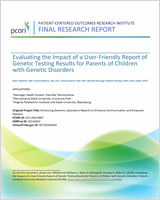
Evaluating the Impact of a User-Friendly Report of Genetic Testing Results for Parents of Children with Genetic Disorders [Internet].
Williams M, Williams J, Rahm A, et al.
Washington (DC): Patient-Centered Outcomes Research Institute (PCORI); 2018 Sep.
Copyright © 2018 Weis Center for Research-Geisinger Clinic. All Rights Reserved.
This book is distributed under the terms of the Creative Commons Attribution-NonCommercial-NoDerivs License which permits noncommercial use and distribution provided the original author(s) and source are credited. (See https://creativecommons.org/licenses/by-nc-nd/4.0/
NCBI Bookshelf. A service of the National Library of Medicine, National Institutes of Health.